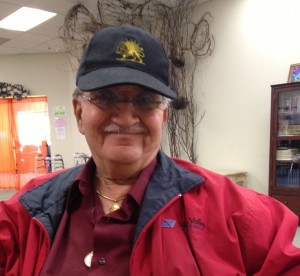Vekhman was receiving care through the Adult Day Health Care program. Through the program, independent centers, like Golden State, provided physical therapy, mental health treatment and a chance to socialize.
In a budget balancing move last year, Gov. Jerry Brown tried to eliminate Adult Day Health Care entirely. But advocates for the disabled sued, and the result was a legal settlement that created Community Based Adult Services. It's a smaller program and has stricter eligibility requirements.
Vekhman has appealed her ineligibility. She feels lucky that Golden State is letting her continue to come for free. But the prospect of being home alone is hard on her. “I cry all day, all day," she says.
According to attorney Alice Ho the state is rejecting people who clearly qualify for the program. Ho and her colleagues at the law firm Ropes & Gray have handled the appeals of 14 of the seniors at Golden State Adult Day Health Care.
“These seniors had either Alzheimer’s or another form of dementia, issues like Parkinson’s disease, coronary artery disease, spinal meningiomas, other tumors,” Ho says. “Imagine older grandparents who’ve actually gotten really sick.”
What frustrates Ho is that all 14 seniors had initially been deemed eligible after face-to-face evaluations with state nurses last year. Officials with the Department of Healthcare Services overturned the nurses’ assessments, creating a lengthy appeals process -- that has resulted in all the seniors getting reinstated.
Golden State Adult Day Health Care has managed to keep providing services to seniors, even though the state is not reimbursing centers during the appeals process. But that's been the exception, not the rule.
At Grace Adult Day Health Care in Sunnyvale, an occupational therapist leads seniors through stretching exercises, giving instructions in both English and Farsi. At this center which serves seniors -- mostly from Iran and Afghanistan -- the state deemed nearly 80 of them ineligible for Community Based Adult Services.
“That's almost half the center,” Grace Adult Day's director Manooch Pouransari says. “And we think all of them are a mistake.”
The seniors here filed appeals earlier this year, but the state hasn't yet decided any of them. Pouransari says he tried to swallow the costs of caring for these seniors, but after three months, it became too much.
“It was a big blow financially to keep them here without the pay.” Pouransari says. “But with the state not responding, no news about hearings, we had to let them go.”
Pouransari says the seniors have suffered strokes, falls and broken hips.
Esfandiar Asbagh, 66, says he's had several falls while he's been home alone. Asbagh was stricken with polio as an infant and can't control the left side of his body.
“I have dizziness,” Asbagh struggles to say. “I'm very deep depression when I am alone.”
Asbagh says what keeps him going is the belief that the state will allow him back in to the program. “I believe 95 to 95 percent I'll win.”
State officials say delays in the appeals process stem from the program's legal battles and that the agency is now moving through the cases much faster. They say hearings are expected to be completed next month. Jane Ogle, Department of Health Care Services Deputy Director, says she stands behind the agency's eligibility determinations, including the ones that have overruled nurses' earlier assessments.
“With such a highly scrutinized program, we need to make sure that our decisions are fair and accurate and correct for each of the participants,” Ogle says. “That's why we put in a quality assurance review for each of these decisions”
On November 8, state officials are expected to explain this in federal court. Advocates for the disabled say the state's eligibility reversals are illegal and are asking a judge to order that all seniors awaiting hearing decisions be reinstated.
